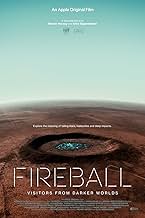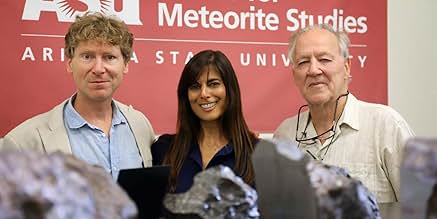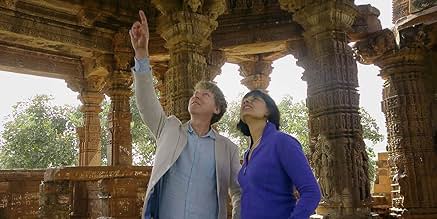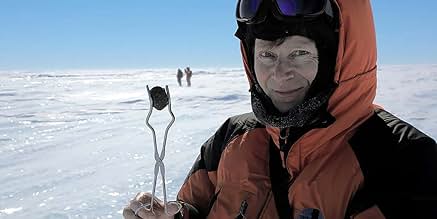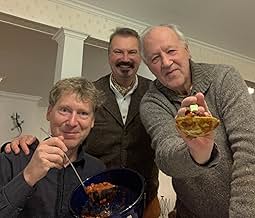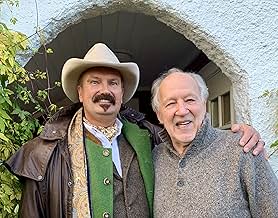Boules de feu: depuis la nuit des temps
Original title: Fireball: Visitors from Darker Worlds
- 2020
- Tout public
- 1h 37m
IMDb RATING
6.9/10
4K
YOUR RATING
A documentary from Werner Herzog about meteors and comets and their influence on ancient religions and other cultural and physical impacts they've had on Earth.A documentary from Werner Herzog about meteors and comets and their influence on ancient religions and other cultural and physical impacts they've had on Earth.A documentary from Werner Herzog about meteors and comets and their influence on ancient religions and other cultural and physical impacts they've had on Earth.
- Directors
- Writer
- Stars
- Awards
- 2 nominations total
- Directors
- Writer
- All cast & crew
- Production, box office & more at IMDbPro
Featured reviews
Definitely not as juicy as some of Werner Herzog's other documentaries. Maybe it was the effect Oppenheimer had on the interviewees; maybe he couldn't get as much out of them as Herzog might have. The subject matter is infinitely intriguing but Fireball just didn't get out of 3rd gear.
As a long-time admirer of Herzog, I wouldn't describe myself as free from bias. I approached this documentary with caution, given my recent experiences with some of his latest work (Family Romance Inc, et al). Without ruining your experience, there is one thing I could say about this documentary: it transmits the passion and drive of Herzog's golden days. Many of the clichés are still there (the soundtrack, for instance), but in a good way. Herzog meets an old friend and together they explore a fascinating topic: meteorites. In the long, silent shots of human faces, the Herzog magic of old re-emerges. As in the old days, Fireball is ultimately a human look no other director could provide. It doesn't have the slow pace of ol'; Herzog's interaction with Hollywood probably has a lot to do with that. But in the end, Fireball deserves to be seen. It is an intimate and colourful exploration of us and the rocks and dust that makes us.
When you watch a documentary by Werner Herzog, what you get isn't just your traditional well narrated documentary. It's a journey. A journey through the world and through different cultures with a specific theme. This time, this specific theme are Meteors and it's origins. Werner Herzog behind the camera and also serving as the narrator, he again comes with support, and like with "Into the Inferno " (2016) this support is the charismatic Volcanologist Clive Oppenheimer.
Calling "Fireball" a traditional documentary isn't the right term. It's a mesmerizing mixture containing the power of science, spectacular pitctures and music. Combined with Herzogs relaxing voice, this documentary works more like a lucid dream than a simple documentary about Meteors. If you watched Into the Inferno on Netflix, you kinda know what to expect. Into the Inferno is also brillant and I cannot recommend it enough. If you have watched Fireball on Apple TV before and now wanna dig deeper into this Arthouse-Documentary style, go for it.
If you plan to watch Inferno, relax, enjoy it with a good Whisky or Whine and let it absorb you. In my opinion, only Werner Herzog is capable of grabbing the viewer in such a way.
Calling "Fireball" a traditional documentary isn't the right term. It's a mesmerizing mixture containing the power of science, spectacular pitctures and music. Combined with Herzogs relaxing voice, this documentary works more like a lucid dream than a simple documentary about Meteors. If you watched Into the Inferno on Netflix, you kinda know what to expect. Into the Inferno is also brillant and I cannot recommend it enough. If you have watched Fireball on Apple TV before and now wanna dig deeper into this Arthouse-Documentary style, go for it.
If you plan to watch Inferno, relax, enjoy it with a good Whisky or Whine and let it absorb you. In my opinion, only Werner Herzog is capable of grabbing the viewer in such a way.
Tiff 2020 02
Fireball: Visitors from Darker Worlds
It's always a joy to listen to Werner Herzog as he goes through his subjects and narrates them and you can see his passion, his excitement for finding unique, hard to find little stories about science, about people around the world and to retell them through his filmmaking skills, to try to share that beautiful things he found in his journey.
However, this film is a bit formless and weak on structure and layout. Herzog and his co-director Clive Oppenheimer just go interview some knowledgeable people and scientists about asteroids and meteorites. There's no arc and momentum about this film, it's just a collection of interviews, locations and some information about meteorites. If you already have an interest about them, this is a must see for you, and if not, well, it's a watchable film but not a very deep or memorable one.
Fireball: Visitors from Darker Worlds
It's always a joy to listen to Werner Herzog as he goes through his subjects and narrates them and you can see his passion, his excitement for finding unique, hard to find little stories about science, about people around the world and to retell them through his filmmaking skills, to try to share that beautiful things he found in his journey.
However, this film is a bit formless and weak on structure and layout. Herzog and his co-director Clive Oppenheimer just go interview some knowledgeable people and scientists about asteroids and meteorites. There's no arc and momentum about this film, it's just a collection of interviews, locations and some information about meteorites. If you already have an interest about them, this is a must see for you, and if not, well, it's a watchable film but not a very deep or memorable one.
It's purely a coincidence that I am reviewing two documentary features in a row - partly brought on by the fact that I don't yet know where to see The Climb or Wolfwalkers. But following up I Am Greta, a movie that wants us to be really sad about the state of the planet, with one that sometimes basks in the Earth's inconsequentiality next to the rest of the Universe (not that this means we shouldn't treasure it; quite the opposite) was an amusing line-up.
There are very few filmmakers who resonate with me in the same way as Werner Herzog, the German legend who all but dominates the very documentary genre. This isn't because I always admire his films, but rather because of the way the indifference of the unfeeling cosmos seems to fascinate him - along with things that are strange and non-human, including grizzly bears and Baby Yoda.
Herzog finds glee where others are brought despair. The non-discriminating, inevitable reality of death, and the chaotic forces that may one day annihilate all of us in a single swoop (no matter how important we deem ourselves, or how desperately we believe in divine reward and greater purpose), are depressing reminders to some, while others look at them with fascinated awe. The only thing I like more about Herzog is the accent.
In Fireball: Visitors From Darker Worlds (viewable on Apple TV), Herzog looks at meteors, as well as the sort of people who have made it their life to look at meteors. We also learn what meteor strikes have come to mean for various hopeful cultures and individuals around our spheroid (a museum in France even carries a message for potential alien visitors, meant to be found if we don't survive the next asteroid hit, and Herzog expectedly jokes about the optimism in the faith that aliens will understand Modern French).
Some peoples have taken meteorites as a sign of our importance (a message from Someone Greater), whereas scientists might take it as a sign that there is insurmountably more to existence than humanity - which is fine.
At Herzog's side is volcanologist Clive Oppenheimer; not to be confused with Joshua Oppenheimer, another giant in the world of documentary film (Herzog was an executive producer on his masterfully disturbing Look of Silence in 2015). But as documentary films go, Fireball is indeed made with expertise, focusing on well-selected subjects and being very well-shot (I found the use of drone cameras to be unusually effective, adding some "size" to our aforementioned spec of a home by transitioning from space rock close-ups to long-shots of an Alsatian vista).
Many of the characters we meet are as fascinating as the very exploration of meteorides and forces immeasurably older than ourselves - particularly delightful, in my opinion, is the Norwegian man who revolutionized the research of so-called micrometeorites; items that fell from space, scarcely the size of a dust grain. A character we don't see enough of, according to some reviewers, is Herzog himself.
But following Oppenheimer (who conducts most of the interviews) is fun too, and Herzog's narrations are more than enough this time. The essentials are still there. We are still very much reminded that, sometimes, the things that make us seem so unfathomably small can also make us feel so unfathomably lucky that we're alive to explore them; that we exist in an age with the right tools; that our place in the solar system even allowed for evolution to reach this point; that the latest Apollo asteroid strike, a moment of immense destruction, made it so we could eventually live.
Who knows? There may even be a reason these stones made their way to humankind after all; something that made them seek us out. Then again, I might just have watched too much Goop Lab to be entirely rational. I hereby issue my apologies for that last bit.
A quick note, just so I can flex my knowledge since kidhood: I have not misspelled the word "meteorite" when speaking of "meteorides" earlier in this post. A meteoride is a piece of space debris (usually from a comet or asteroid, both of which distinguish themselves from meteorides in that they actually orbit a star) that becomes a METEOR when entering a planet's atmosphere, and METEORITE if it lands on the surface.
There are very few filmmakers who resonate with me in the same way as Werner Herzog, the German legend who all but dominates the very documentary genre. This isn't because I always admire his films, but rather because of the way the indifference of the unfeeling cosmos seems to fascinate him - along with things that are strange and non-human, including grizzly bears and Baby Yoda.
Herzog finds glee where others are brought despair. The non-discriminating, inevitable reality of death, and the chaotic forces that may one day annihilate all of us in a single swoop (no matter how important we deem ourselves, or how desperately we believe in divine reward and greater purpose), are depressing reminders to some, while others look at them with fascinated awe. The only thing I like more about Herzog is the accent.
In Fireball: Visitors From Darker Worlds (viewable on Apple TV), Herzog looks at meteors, as well as the sort of people who have made it their life to look at meteors. We also learn what meteor strikes have come to mean for various hopeful cultures and individuals around our spheroid (a museum in France even carries a message for potential alien visitors, meant to be found if we don't survive the next asteroid hit, and Herzog expectedly jokes about the optimism in the faith that aliens will understand Modern French).
Some peoples have taken meteorites as a sign of our importance (a message from Someone Greater), whereas scientists might take it as a sign that there is insurmountably more to existence than humanity - which is fine.
At Herzog's side is volcanologist Clive Oppenheimer; not to be confused with Joshua Oppenheimer, another giant in the world of documentary film (Herzog was an executive producer on his masterfully disturbing Look of Silence in 2015). But as documentary films go, Fireball is indeed made with expertise, focusing on well-selected subjects and being very well-shot (I found the use of drone cameras to be unusually effective, adding some "size" to our aforementioned spec of a home by transitioning from space rock close-ups to long-shots of an Alsatian vista).
Many of the characters we meet are as fascinating as the very exploration of meteorides and forces immeasurably older than ourselves - particularly delightful, in my opinion, is the Norwegian man who revolutionized the research of so-called micrometeorites; items that fell from space, scarcely the size of a dust grain. A character we don't see enough of, according to some reviewers, is Herzog himself.
But following Oppenheimer (who conducts most of the interviews) is fun too, and Herzog's narrations are more than enough this time. The essentials are still there. We are still very much reminded that, sometimes, the things that make us seem so unfathomably small can also make us feel so unfathomably lucky that we're alive to explore them; that we exist in an age with the right tools; that our place in the solar system even allowed for evolution to reach this point; that the latest Apollo asteroid strike, a moment of immense destruction, made it so we could eventually live.
Who knows? There may even be a reason these stones made their way to humankind after all; something that made them seek us out. Then again, I might just have watched too much Goop Lab to be entirely rational. I hereby issue my apologies for that last bit.
A quick note, just so I can flex my knowledge since kidhood: I have not misspelled the word "meteorite" when speaking of "meteorides" earlier in this post. A meteoride is a piece of space debris (usually from a comet or asteroid, both of which distinguish themselves from meteorides in that they actually orbit a star) that becomes a METEOR when entering a planet's atmosphere, and METEORITE if it lands on the surface.
Did you know
- TriviaWill mark the third collaboration between Werner Herzog and Clive Oppenheimer after Au fin fond de la fournaise (2016) and Rencontres au bout du monde (2007).
- ConnectionsFeatures Deep Impact (1998)
Details
- Release date
- Country of origin
- Language
- Also known as
- Fireball: Visitors from Darker Worlds
- Filming locations
- Mecca, Saudi Arabia(Kaaba Black Stone)
- Production companies
- See more company credits at IMDbPro
- Runtime
- 1h 37m(97 min)
- Color
Contribute to this page
Suggest an edit or add missing content


